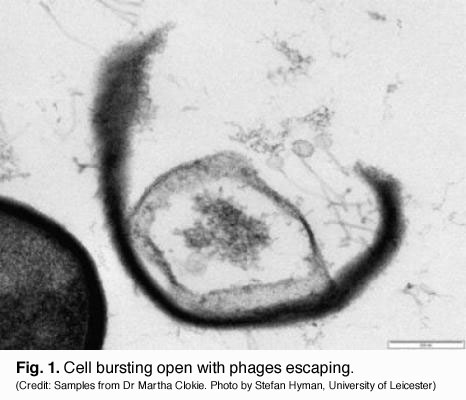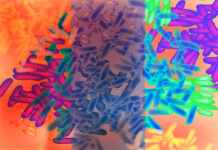A team of scientists from Europe has recently isolated a group of naturally-occurring viruses that specifically target the highly infectious hospital superbug Clostridium difficile (C. diff). Dr Martha Clokie of the University of Leicester has been investigating bacteriophages, meaning ‘eaters of bacteria,’ as an alternative to antibiotics.
According to Dr Clokie, “Ever since the discovery of the first antibiotic, penicillin, antibiotics have been heralded as the ‘silver bullets’ of medicine. They have saved countless lives and impacted on the well-being of humanity. But less than a century following their discovery, the future impact of antibiotics is dwindling at a pace that no one anticipated, with more and more bacteria out-smarting and ‘out-evolving’ these miracle drugs. This has re-energized the search for new treatments.”
 “One alternative to antibiotics is bacteriophages — referred to as phages. Unlike antibiotics, phages are specific in they infect and kill only one particular species, or strain, of bacteria. Following attachment to a host bacterium, bacteriophages inject their DNA into the bacterium, which then replicates many times over, ultimately causing the bacterial cell to burst open. The phages released from the dead bacterium can then infect other host cells.”
“One alternative to antibiotics is bacteriophages — referred to as phages. Unlike antibiotics, phages are specific in they infect and kill only one particular species, or strain, of bacteria. Following attachment to a host bacterium, bacteriophages inject their DNA into the bacterium, which then replicates many times over, ultimately causing the bacterial cell to burst open. The phages released from the dead bacterium can then infect other host cells.”
Dr. Clokie and her team have isolated and characterised the largest group of bacteriophages known to be capable of infecting C. diff. Of these, a specific mixture of phages has been shown through extensive laboratory testing to be effective against 90% of the most clinically relevant C. diff strains.
“C. diff bacteria primarily affect our digestive system. While relatively innocuous in individuals with a healthy stomach bacteria (gut flora), they pose a serious threat when our natural digestive environment is disrupted or depleted, such as after chronic antibiotic use. In such individuals, C. diff infections can cause severe diarrhea, vomiting and dehydration. Collectively, these symptoms can prove life threatening, particularly in elderly patients.
“In addition to killing the C. diff bacteria, antibiotics also destroy the ‘good’ gut bacteria, in turn increasing the potential for relapse or new infections.
“The key advantage of using phages over antibiotics lies in their specificity. A phage will infect and kill only a specific strain/species of bacteria. This is particularly important when treating conditions like C. diff infections, where maintenance of the natural balance of gut bacteria greatly reduces the chance of relapse.”
Dr. Des Walsh, Head of Infections and Immunity at the Medical Research Council, said: “Antibacterial resistance is a major and growing threat to health globally. New treatments and therapies are sorely needed. This study by Dr Clokie examines a new way to kill bacteria to circumvent resistance formation. She has established an impressive collection of “phage” viruses and has developed strong partnerships to translate her research into potential new treatments for Clostridium difficile infection — an excellent example of moving basic experimental MRC funded research along the development pipeline.”
The newly isolated phages have been licensed by a US-based biopharmaceutical company, AmpliPhi Biosciences Corporation. A pioneer in developing phage-based therapeutics, AmpliPhi has already made progress in developing phages targeted against Pseudomonas aeruginosa, a pathogen that causes acute, life-threatening lung infections in cystic fibrosis patients. AmpliPhi has already demonstrated the effectiveness of Pseudomonas phages in controlled and regulated human clinical trials.
AmpliPhi is funding development and testing of C. diff phages developed by Dr. Clokie with the stated goal of having a phage mixture ready to go into phase 1 and 2 clinical trials. This will involve optimizing phage-preparations for maximum efficacy against C. diff infections from around the globe and establishing production, storage and delivery systems for the phage mixture.
For Dr. Clokie, who spent the last 6 years working on C. diff phages, these are very exciting times. “We hope our partnership with AmpliPhi will lead to the introduction of a much-needed change in the way C. diff infections are treated,” she said.
“The use of phage-based therapy could eliminate the negative impact of antibiotics on the gut flora, minimise chances of relapse, provide patients with an effective, lasting safeguard against these life-threatening bacteria and relieve a substantial portion of the health-care and financial burden this superbug poses. Ultimately, I hope this will pave the way for a greater use of bacteriophages in the wider, global fight against antibiotic-resistant bacteria.”
Source: University of Leicester (2013, October 16). Bacteria-eating viruses ‘magic bullets in the war on superbugs’. ScienceDaily. Retrieved October 18, 2013, from http://www.sciencedaily.com/releases/2013/10/131016212558.htm.














